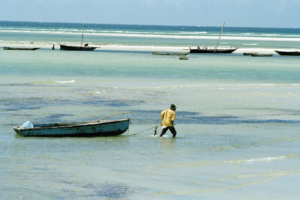Innovative African Startups Win 2023 Milken-Motsepe Prize for Agritech
 The Milken-Motsepe Innovation Prize Program for AgriTech is a multi-year, multi-million dollar competition in Africa. Companies and nonprofits advance technological solutions accelerating the United Nations (U.N.) SDGs. In hopes of expanding in the global market, many African startups proposing innovative AgriTech solutions compete to win a grand prize of $1 million. The competition provides the chance to attract the attention of investors. In May 2023, the winners were announced.
The Milken-Motsepe Innovation Prize Program for AgriTech is a multi-year, multi-million dollar competition in Africa. Companies and nonprofits advance technological solutions accelerating the United Nations (U.N.) SDGs. In hopes of expanding in the global market, many African startups proposing innovative AgriTech solutions compete to win a grand prize of $1 million. The competition provides the chance to attract the attention of investors. In May 2023, the winners were announced.
The 1st Place ($1 Million Prize): NovFeed
Tanzania faces a yearly demand deficit of 480,000 metric tons of fish. Although local fish farmers could capitalize on this demand, the country lacks access to reasonably priced and high-quality fish feed. This forces people to formulate their own feed, which lacks nutrition and stunts fish growth. Not only does selling inferior fish negatively affect the fish farmers’ incomes, but it also affects the health and well-being of consumers who are often from lower-income Tanzanian households.
NovFeed is a Tanzanian biotech startup that upcycles organic food waste into protein feed for livestock and fish. To resolve the lack of access to quality fish feed, NovFeed uses a bioreactor to combine fermented plant extract with bacteria culture, producing a protein powder that holds greater amounts of protein than traditional feed such as fishmeal and soybean. Indeed, fish that fed on NovFeed had a 97% survival rate and showed 40% more weight gain than those that fed on traditional feed, according to Solve.
NovFeed is highly scalable and costs 30% less than fishmeal and soybean. The startup’s innovative approach provides cheap, traceable and non-animal feed using indigenous ingredients. It also addresses unsustainable practices by current fish feed manufacturers. The production of soybean drives deforestation and the production of fishmeal disrupts the marine food chain by overfishing small fish.
If NovFeed expands globally and its intellectual property spreads to other companies, it has the potential both to end unsustainable fishing practices and reduce world poverty. Accordingly, the Milken-Motsepe prize has recognized NovFeed as one of the most innovative African startups in long-term sustainability.
The 2nd Place ($350,000 Prize): Karpolax
In Kampala, Uganda, many farmers and fruit vendors lose income due to the low shelf life of their produce, especially mangoes. Fruits and vegetables often rot before they can sell them. To resolve this issue, Ugandan-based startup Karpolax uses nanotechnology to extend the shelf life of fruits and vegetables by at least 33 days without losing nutritional value. According to Karpolax, 37% of food produced is lost between production and consumption, contributing to “huge losses to the farmers and everyone on the value chain.” The lack of access to fruit causes diseases that kill one in seven people.
Karpolax produces sachets infused with polymers that, when simply dropped in a box of fruits, inhibit fruits’ release of enzyme phospholipase D, which is responsible for deterioration. Karpolax’s product has a great market advantage, as it is the first of its kind in Uganda or East Africa. In comparison, its strongest competitor extends shelf life by only 20 days. The startup has had massive success in the Kampalan fruit market and increased vendors’ income by up to 25%. Karpolax is among many African startups that not only increase producers’ revenues but also contribute to enhancing consumers’ health.
The 3rd Place ($150,000 Prize): IRRI AfricaRice
Africa heavily relies on rice cultivation. Around 40% of Africa’s total rice farm area is in rainfed lowlands. For this reason, the livelihoods of African rice farmers are vulnerable to flooding due to climate change, which kills many crops before farmers are able to make sales. Using the SUB1 gene responsible for flood tolerance, IRRI AfricaRice has developed varieties of rice crops that survive over two weeks of complete submergence, compared to market varieties that survive only one week. The team believes that investment in its innovation could produce $3 billion in returns for African countries experiencing flooding, especially in sub-Saharan Africa.
Other Notable Prizes
Among the other innovative African startups that became finalists, a South African company Kuronga won the $100,000 prize for “Most Creative Use of 4IR,” which refers to “Fourth Industrial Revolution” technologies such as AI and machine learning.
Much of small-scale African farmers’ produce goes unsold because sellers cannot find suitable buyers for their product’s grade and price. Individual buyers may value a range of things such as shelf life, freshness and volume. Using the app Kuronga, sellers can snap a photo of their produce, after which the app uses machine learning to grade its quality and pair it with the right buyer.
Cote D’Ivoire-based COOL LION won the $100,000 “People’s Choice” prize. It rents out solar-generated refrigeration and cold storage. Its services save electricity money and provide a sustainable way for fish farmers to store their products. This is a big step in solving Cote D’Ivoire’s long-standing issue of tons of fish spoiling every day due to unaffordable cold storage facilities.
Looking Ahead
The Milken-Motsepe Innovation Prize Program for AgriTech in Africa has showcased the immense potential of African startups to address pressing challenges in the agricultural sector. Winners like NovFeed, with its innovative approach to producing high-quality fish feed, show the potential to transform not only the fishing industry but also contribute to reducing global poverty. Similarly, Karpolax’s nanotechnology solution to extend the shelf life of fruits and vegetables offers promising opportunities for farmers and consumers alike. These innovative African startups are paving the way for sustainable practices and economic growth in the region.
– Eric Huang
Photo: Flickr
